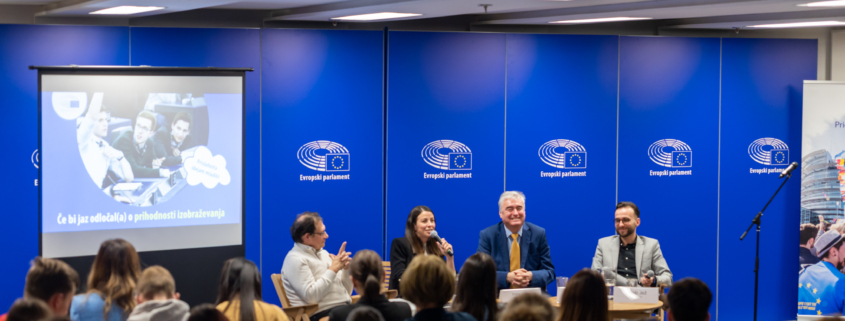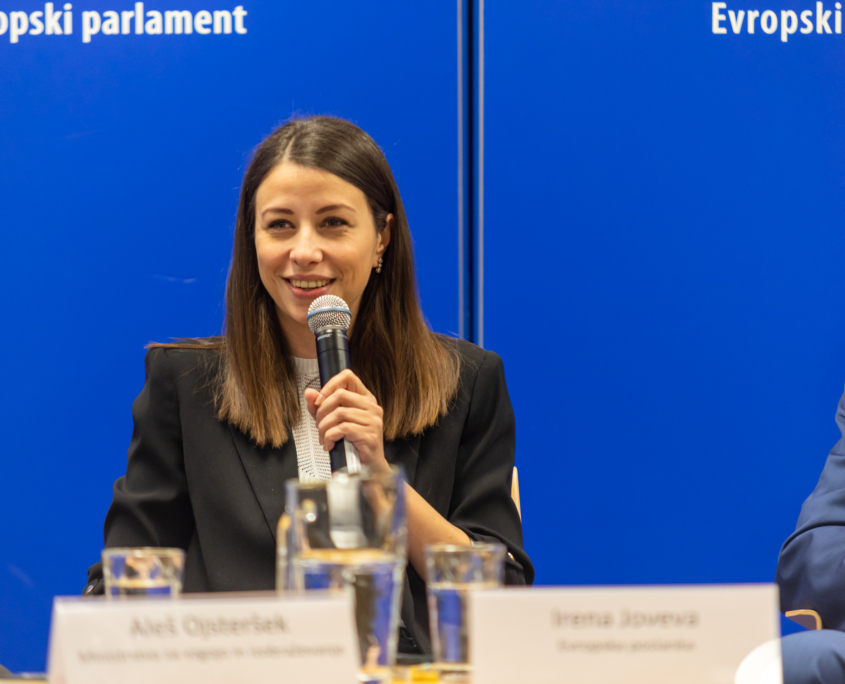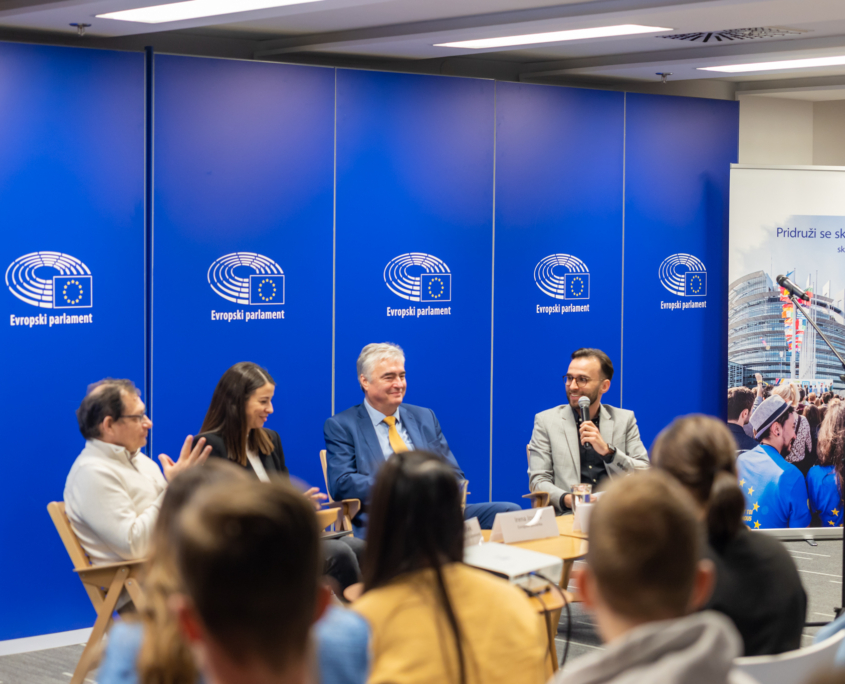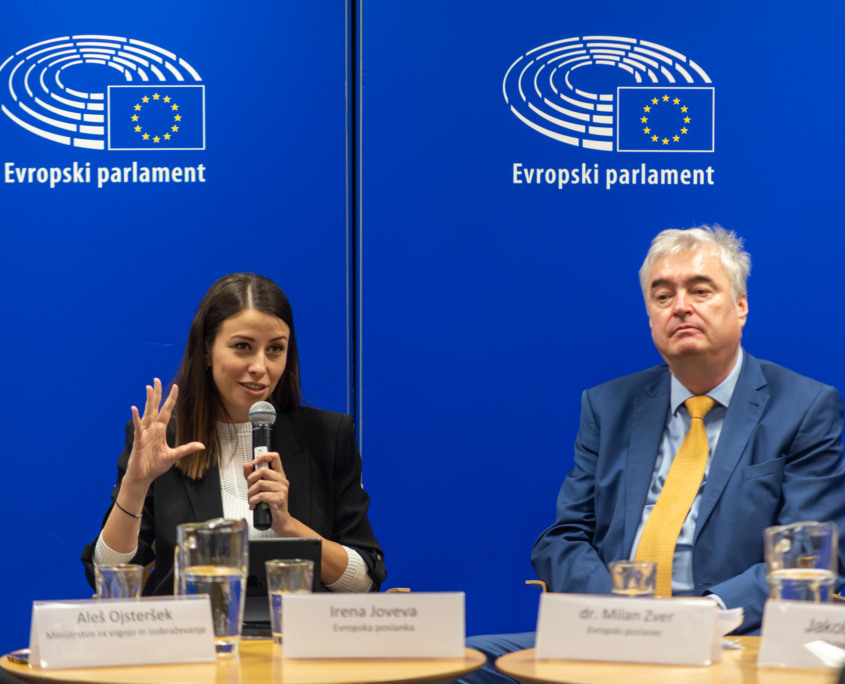On Friday, 24 February 2023, MEP Irena Joveva took part in a debate with secondary school students entitled If I had a say in the future of education… which was organised as part of the European Parliament Ambassador School project. “We appreciate your honesty, the school system is rigid, adjustments are certainly in order, and your ideas are good,” said the MEP.
During the event, young people took on the role of decision-makers and presented their proposals for action in the field of education.
By way of introduction, the MEP explained that, while education is a matter for each Member State, it is supported, promoted and assisted by the European Union through its activities, which include recommendations, guidelines and plans, as well as through various programmes such as Erasmus+ and the European Solidarity Corps.
In this context, Joveva sees room for improvement and perhaps for even more EU competences in some segments of education, as leaders in the Member States might have different priorities, but it is paramount to ensure quality and equality in education.
The participants put forward many interesting suggestions.
The Gimnazija Bežigrad students focused on computer literacy. They believe that the education system could adapt to the rapid technological advancement by increasing the number of IT lessons, and providing lessons on how to evaluate the reliability sources and other data. They also mention the lack of classes on financial literacy and would like to see the introduction of the use of interactive 3D models to facilitate visualisation and understanding of the topics covered.
The Secondary School of Nursing Ljubljana would prefer an education system where everyone receives individual attention and is able to develop their potential. This could be achieved, they say, through additional teacher training with emphasis on modern teaching methods such as project work and lifelong learning.
The Josip Jurčič Secondary School in Ivančna Gorica proposed introducing the use of tablets. They suggest moving away from the mere reproduction of facts and believe that instead of focusing on quantity, more emphasis should be placed on the quality of the knowledge acquired. “Children need more than just sitting at desks, copying from the board, doing homework and cramming to get good grades in exams.” They would like to see more social skills and compulsory tutoring or learning support provided by upper-secondary students.
Students of Gimnazija Murska Sobota opined that, in the future, education should be a combination of distance learning and classroom work, as this would help students develop stronger technological skills. They proposed that vocationally oriented education should start as early as 6th grade, or that students be grouped according to their abilities. They also stressed the need for more physical education.
The Gimnazija Celje Center has proposed that the EU should provide funding to modernise school systems and adult education, so that adults would be guaranteed a minimum wage while in education. They also suggest the setting up of centres for the recognition of non-formal education. They would be in favour of EU legislation that would provide for compulsory participation of pupils and students in community programmes.
The students of the Piran Electrical Engineering and Maritime School would develop a core curriculum for all educational institutions in the EU to facilitate the transition of young people to a foreign educational institution for a student exchange, while the students of Gimnazija Šiška would put more emphasis on lifelong learning. They proposed introducing compulsory first aid training and entrance exams for university enrolment.
The future lies in a more relaxed working and learning atmosphere, said the Domžale Secondary School. This would be achieved by having fewer subjects, which would allow for more focus and deeper knowledge instead of cramming. In their view, the school year should be divided into three assessment periods. The tests and assessment of knowledge would be group-based to a greater extent, which would bring teamwork to a higher level.
“There is not enough practical learning in our education,” said the Technical Education Centre Ljubljana. They therefore proposed more internships, specialist courses and sports. They propose making student exchange compulsory and a higher number of field trips .
Students from Gimnazija Kranj wish for more creative thinking. They suggested the introduction of a creativity day, where creative thinking would be taught through workshops and lectures in different (subject) areas – photography, improvisation, 3D animation, and others.
In turn, the I. Gimnazija v Celju proposed the introduction of a special scholarship for gimnazija students, while the School of Service Industries in Velenje reiterated the proposal on the use of tablets in classes, as it would reduce paper consumption and ensure uniform notes. Experiments, discussions, creative writing, public speaking, teamwork and project work would be the main learning activities.
In principle, schools declare their commitment to the principles of social equality, but the reality is different. For this reason, the young students of Gimnazija Litija would like to introduce formalised additional professional support for secondary schools and faculties, as well as additional staff who would be able first to perceive the need for such support and then also provide it.
Responding to the proposals, MEP Joveva said that she was delighted to see so much activity from young people. In her view, many of the ideas presented could be taken on board by the competent authorities, as the education system will need to adapt to today’s fast-paced world and young people know first-hand where adjustments should be made.
The MEP was accompanied by Viktor Kollar from Slovene Philanthropy, who attended the event as a “shadow MEP” (you can read more about the project here). Young participants also received comments to their proposals from MEP Milan Zver and Aleš Ojsteršek, Head of the Education Development Division at the Ministry of Education.








Leave a Reply
Want to join the discussion?Feel free to contribute!